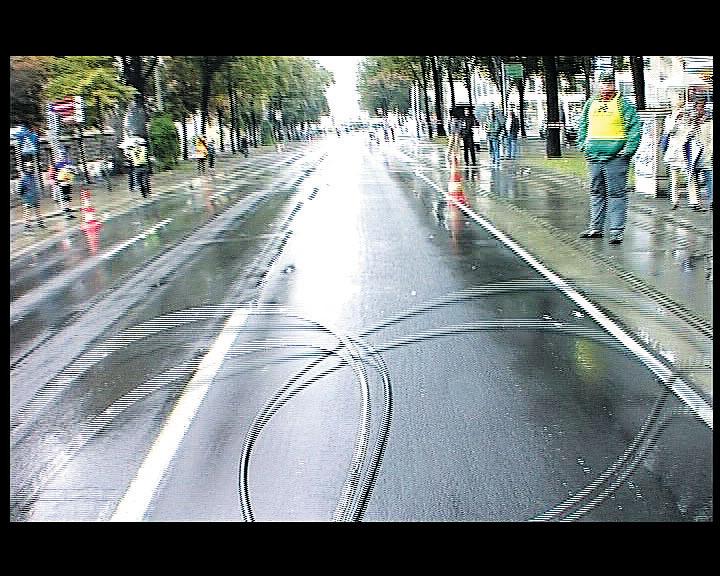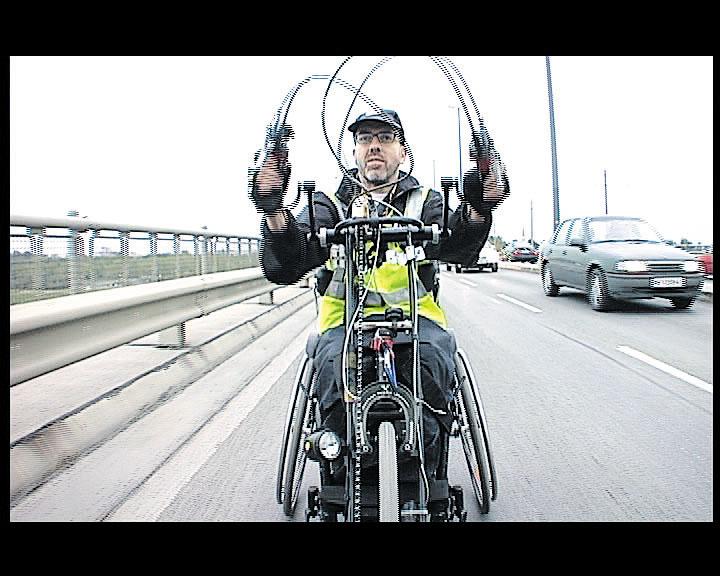handbikemovie
The brake cables of Martin Bruch´s handbike - the handlebars of which serve at the same time as a manually operated driving-pedal - appear and disappear in a regular rhythm at the lower edge of the screen: A never-ending repetitious rotary winding motion that seems not only to carry forward the vehicle but the movie itself as well.
Since 1992, when he was diagnosed as being afflicted with multiple sclerosis, Martin Bruch has been moving along with the help of mechanical appliances. At first he used a scooter, now, as this is no longer possible, he depends mainly on a handbike. From 12/2001 to 12/2002 he filmed his rides through big cities and in the countryside employing a helmet cam: These images and sounds represent at least an approach to his own perception. Thus the audience of his documentary handbikemovie will find itself being stuck in a traffic jam on New York´s Times Square, between tramways and car lanes on the Vienna Ring, or alongside a double-decker bus in the heavy traffic of London. Motors are vibrating all around, tyres are thundering on the asphalt, and now and then sounds of music can be heard from a passing-by convertible.
Not a single one of the traffic ways Martin Bruch moves into with his handbike during the film is designed for him, that is to say, for a vehicle like his. As a driver of a three-wheeler handbike he is legally not allowed to use cycle-tracks or highways. By nevertheless driving on such traffic ways, he refuses to comply with a reglementation of space which by now has become a self-evident matter of course for everyone. Formally handbikemovie is clearly structured: 56 shots, strung together in straight cuts, connected merely by the subjective perspective of the camera attached to the helmet as leitmotiv and the winding forward movement. A conceptual study about movement, effort, and duration with no need for narration in the classical sense.
(Maya McKechneay)
Translation: Horst Friessner
handbikemovie is an autobiographical visual account of a chapter in my life and in this respect it is the logical sequel of my book of photographs Bruchlandungen (crash-landings). For five years now have I ridden my handbike every day and in all weathers. So far I have already travelled and experienced 1600 kilometres amongst vehicles whose drivers and passengers remain incognito as they hardly can be made out behind the reflecting windows.
As a traveller who is slower than the rest, especially when the road is rising, but is almost as fast as the cars when it leads downward, I have been experiencing the road with its ups and downs in silence, loneliness, and isolation - but not without amusement. The perspective when riding a
handbike, sitting in the open air, - riders of a convertible do have a similar sensation, without a
need for making a great effort however - is unusual, but as far as I am concerned it´s the ordinary thing.
My slow motion (5 - 1O km/h) amidst the roaring traffic; the actual danger everyone can see who is passing me by: I myself cannot see it; it is something that happens behind my back. My freedom to ride anywhere I want, in "complete" autonomy and as a matter of course (despite considerable dependence on the ones that surround me, for example only in order to get onto the street in the first place).
Riding through the city on a handbike - what an adventure, not only because of the wheelchair.
Speeding down steep mountain roads: thrilling, and, what a view!
To meet people, dialog
To watch - to be involved
(Martin Bruch)
--> DVD available at: www.handbikemovie.com or at sixpackfilm
handbikemovie
2003
Austria
99 min


